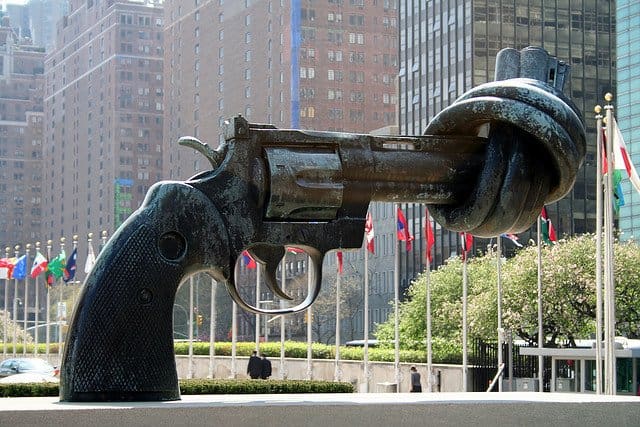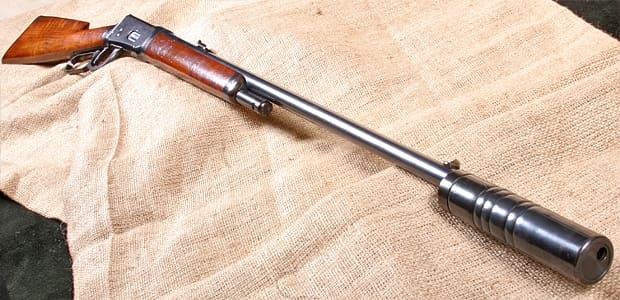
When you read the entire case two distinctive versions of events are discerned. Neither version would justify the police actions. That is why the conviction was overturned. Here is what both sides seem to agree on:
An unmarked police car slowly drove through a poor black neighborhood. A man and a woman were standing on the porch of a row house. Another man stood a couple of feet off of the porch with his back to the street, talking to the other two. There were two police officers are in the car. The officer in the passenger seat told the driver to stop the car. At about the same time, the person standing off of the porch quickly ducked into the house and locked the door.
The police officers called for backup. After five to six minutes, backup arrived and the police had obtained keys to the house. The two initial officers unlocked the door and searched the house.
Inside, they found two men. In one of the bedrooms, they found a semi-automatic handgun hidden under a mattress. The handgun wasn’t listed as stolen. Evidence was not allowed showing the legal owner of the handgun. A resident of the house testified that the handgun belonged to his brother, who lived in the house with him.
After the suppression hearing, but before trial, the State orally moved to preclude (Markell) Horton from introducing evidence regarding the gun’s ownership and whether the gun was stolen. Horton sought to introduce a document from the Department of Justice’s Bureau of Alcohol, Tobacco, and Firearms Explosives National Tracing Center naming the owner and showing that the weapon was not stolen.
The man who ducked into the house had two prior convictions for non-violent felonies in “1998 and 2003 for possession of a controlled substance with intent to deliver.” He was not a resident of the house.
One of the critical points was whether the officers actually saw a gun or not before entering the house.
The officer in the passenger seat (Roderick Hummons) said he saw a bulge in the waistband of the defendant, and that he glimpsed a “metallic object” as the subject briefly turned as the car passed the house. The bulge and the “metallic” object were not mentioned to his partner, nor were they included in the initial incident report or the arrest report.
I found the following assertion disturbing, but the court did not comment on it.
Hummons said he found a set of keys on the floor of the porch near where the woman was sitting. The man and woman were detained in the police car while the officers called for backup. They were searched before being put in the car.
If an officer finds a set of keys, does that give them the authority to enter a house? As a former officer, I find it more likely that the keys were found in either the man’s or woman’s pockets, but we don’t have testimony to that effect.
Most cases such as this would be plea bargained, but this case was taken to a jury trial, and then appealed. Here’s the Second Division Appellate Court of Illinois’ decision:
[*P1] Chicago police officers, in their mission to “serve and protect,” must remove from the city’s streets illegal guns, which claim hundreds of lives each year and imperil the public’s safety and security. Presumably acting on that laudable desire, an officer had a hunch, based on seeing “a metallic object” in Markell Horton’s waistband, that Horton might have a handgun and pursued him. Eventually, police found a handgun hidden under a mattress in a bedroom where they found Horton, and he was charged with possession. But changes in Illinois law (in part mandated by United States Supreme Court rulings protecting the right to keep and bear arms) now hold that it is not illegal to carry a concealed handgun, as long as certain procedures are followed.
[*P2] As judges, we are stuck between a hammer and the anvil. On the one hand, we are ever mindful of, and horrified by, the level of gun violence that continues to plague the City of Chicago. We feel confident in saying that all members of the judiciary wish for reformative solutions. But we also are mindful of our limited role in a constitutional system. We cannot sidestep or disregard instruction from both the United States and Illinois Supreme Courts to achieve a specific outcome. When we hold that precedent dictates the result here, it is not because we are naïve, or “soft on crime.” On the contrary, it is because we must follow, not rewrite, the established law and the facts in evidence.
[*P3] We now turn to the specifics of Horton’s appeal. Horton argues four issues: (i) the trial court improperly denied his motion to quash arrest and suppress evidence; (ii) the trial court improperly barred him from introducing registration and ownership evidence of the weapon, both before and after the State “opened the door” to the evidence; (iii) reasonable doubt; and (iv) ineffectiveness of trial counsel. In addition, this court ordered supplemental briefs on the issue of probable cause to pursue Horton “in view of the rulings in District of Columbia v. Heller, 554 U.S. 570 (2008); McDonald v. City of Chicago, 561 U.S. 741 (2010); People v. Aguilar, 2013 IL 112116; and People v. Burns, 2015 IL 117387.”
[*P4] We hold that the trial court improperly denied Horton’s motion to quash arrest and suppress evidence. The probable cause to pursue Horton was based on the officer’s belief that Horton possessed a gun in violation of the unlawful use of a weapon statute (720 ILCS 5/24 1.1(a) (West 2010)), later found unconstitutional on its face and void ab initio. Aguilar, 2013 IL 112116; Burns, 2015 IL 117387. As a result, the search and seizure of the gun was unlawful and the trial court erred when it denied Horton’s motion to quash his arrest and suppress the evidence.
As a gun owner, it’s distressing that so little attention was paid to the actual owner of the firearm. It seems that the owner was a resident of the house that was searched. It appears that he followed the rules in obtaining and keeping the firearm.
Was the pistol returned to him? That seems highly unlikely. The costs of obtaining a court order from a judge for the return of the pistol would be far more than the firearm is worth. Moreover, finding a judge in Chicago who would be willing to issue such an order is highly problematic.
California used to be notorious for this sort of “legalized theft.” It took several lawsuits to force the California legislature to create a system for lawful gun owners to recover firearms that had been impounded. Many police departments around the country still follow an unspoken rule: never return firearms without a court order that forces you to do so.
Perhaps this case will help bolster the rule of law in Chicago. It is a step in the correct direction.
Link to Gun Watch








I am about 95% sure this was covered on this blog less than a month ago.
Yep.
http://www.thetruthaboutguns.com/2017/04/johannes-paulsen/youll-never-guess-states-courts-just-made-decision-protecting-gun-owners/
It was, but the details about the felon not being the gun or the house owner were omitted.
I think there were mixed sentiments. Some thought that this was police overreach. Some thought that if a cop sees a guy walk into his house that’s somehow reasonable cause for the cops to break in.
“We cannot sidestep or disregard instruction from both the United States and Illinois Supreme Courts to achieve a specific outcome.”
That never seems to stop the 9th ‘Circus’ from pushing their anti-civil right Progressive agenda…
Hell, even with a court order, it can be nearly impossible to pry firearms from the grasp of the LAPD, LASO, SFSO or SFPD. In one case (up on appeal after the trial court incorrectly dismissed a complaint on res judicata grounds), the LA city attorney obtained a court order for destruction of a large collection of firearms, without notice to defendant, after charges against the defendant had been dismissed, and during negotiations through defendant’s attorney for return of the firearms. (I don’t think that there is any question that the city attorney’s acts were unethical and unprofessional.) The California DOJ issues letters to police departments authorizing release of firearms (mostly handguns) but some police departments refuse to accept these as “proof of ownership” sufficient to allow the return.
So did the misbehaving cops get slapped down?
ROTFLMFAO
They probably got commendations for their “initiative.”
“Cop Club:” To Protect and Serve Ourselves!
“If an officer finds a set of keys, does that give them the authority to enter a house? As a former officer…”
…you should know that an illegal entry is an illegal entry. If you kick the door down or it’s left unlocked it doesn’t matter (except perhaps for damages).
I think the previous post here gave more of the prosecution’s view of events. The cops see someone they believe is carrying a firearm. The person then flees inside. While neither flight from police nor the mere possession of a firearm* constitutes enough evidence to detain, the two together- especially in a high-crime area- is often enough for a court to rule that there is at least reasonable suspicion. Reasonable suspicion is enough to detain someone and, when there is a weapon involved, conduct a frisk. There is also plenty of caselaw that allow police to enter a domicile without a warrant under the exigency doctrine if they are chasing someone who is in ‘immediate flight’ from them. But does that require probable cause? Was this subject necessarily in ‘flight’ or being chased when he went inside? Would it not have been possible to use a less intrusive means? The court in question found that it was illegal. I’d say two things:
1) Another court could easily find the opposite
2) This opinion, given its jurisdiction, is better understood as a pro-criminal ruling than a pro-gun one.
*- if you live in a place like NYC, MD, DC, NJ, HI, etc the mere act of carrying a gun is sufficient evidence but in Illinois there are carry permits which is why someone having a gun isn’t enough
I think the courts are terribly in the wrong. Given the reputation that cops and prosecutors often screw-over innocent people, it is only natural that a lot of people who are doing nothing wrong might flee quickly when police show up. That should never be a determining factor for probable cause.
Flee? I’ve walked into my house many many times. Sometimes even when cops were on my street. How on earth is that “flight from cops”?!?
Not to put too fine a point on this, but I am pretty sure that flight from cops only occurs AFTER they try to stop you. Walking, or even running, from your porch to the front door does not meet that.
Also, since when does the mere suspicion of having a gun count as half the cause to violate someone’s 4th? If I go jogging with a gun, am I fleeing and in need of detainment?
I’m assuming you don’t live in a high crime neighborhood, don’t deal with urban criminals, or deal with the police very much. These plainclothes cops have probably taken hundreds if not thousands of guns off of drug dealers and gang bangers in that neighborhood, seeing this exact same patern of behavior/movements, body language, etc….. so, to answer your question, no. No, you walking in to your house or jogging with your gun is not the same thing. It’s you projecting your reality/values in to an alien universe.
My values include cops who don’t break into homes without probable cause. Who introduce “evidence” not initially mentioned in the police report. Who suppress evidence about who actually owns the gun and lives in this house.
Perhaps that’s indeed an alien universe that I’m “projecting” into. But according to the court in this case, thankfully I’m not alone.
You’re welcome to have and champion different values. Understand that when you advocate for cops breaking into homes, suppressing evidence, adding testimony not shared with their partner or in the initial report… Your stupidity will be challenged.
California Richard,
You are not listening. Scurrying up the front porch into a home is NOT a crime. Having a concealed handgun in your waistband on private property is NOT a crime.
Neither element by itself nor taken together is reasonable suspicion that someone committed a crime or is about to commit a crime.
Every single person driving a car on a public road could be a felon who recently used their car to drive over someone and kill them. If a cop sees:
(a) a car parked in a driveway,
(b) the car has a dent in the bumper,
(c) the driver quickly moves the car into the garage, and
(d) the driver closes the garage door,
is that reasonable suspicion for police to bust into the garage and arrest anyone in the garage?
Again…. you’re mishmashing realities. No, the cops were wrong in this particular case. But the cops were justified in their actions in a demonstrably VERY high crime neighborhood (I dont need to reference the hundreds of articles and comments here at TTAG recognizing that fact) observing actions that were consistent with criminal behavior re: SCOTUS case Illinois vs Wardlow c.2000.
Again…. unless you live in a high crime neighborhood (i.e. West Chicago, West Oakland, etc), then you are speaking from another planet.
This court is recognizing other case law that applies to areas not prone to gang violence that effects YOU in YOUR neighborhoods….. elitist? Yep. But thats reality and YOU benefit. So, no, you will not be searched walking in to YOUR house or jogging down the street in YOUR neighborhood.
So, which is it? Were the cops wrong, or justified? You literally said them back to back.
The cops sit for minutes waiting for backup and NEVER mentions that the supposed perp has a gun?!? Doesn’t put it in the incident report. Basically waits until the court room to bring it up.
How on earth am I miss mashing facts? The facts are simple. Going inside a house is not fleeing. Carrying a gun on private property isn’t illegal. The two put together DO NOT CONSTITUTE REASON TO BREAK INTO A HOME AND STEAL PROPERTY!!!!
That’s of course assuming that the cop ACTUALLY thought he saw a gun and was just too incompetent to bring it up with his partner, or fill out an incident report. Instead of lying to cover his ass.
I could literally eat a bowl of alphabet soup and shit a better argument than you just made.
Both. The world is not black and white. Judges exist to somewhat define the lines and even they disagree.
Yes, CA Richard, we understand. A white man in CA jogging is way different from a black man in Chicago running.
You’re a Fudd.
“You’re a FUDD” seems to be the equivalent of “You’re a racist”. If we are better then the libtards who spout one liners, then please articulate an argument. “California Richard is a FUDD/racist because……”
He did articulate an argument. It was a mockery of your extremely ridiculous belief that cops should have different standards of search and seizure based on a neighborhood.
They do.. Illinois vs Wardlow c.2000.
Oh… and the cops were idiots, lazy, and/or liars. They should have obtained a warrant once they established their presence in the house or obtained uncoerced written consent…. this case was begging to be thrown out. Im suprised a lower court didnt can it sooner.
For you to claim that there are different standards for search and seizure based on your neighborhood is you telling me that there is no such thing as “equal protection under the law”.
If there is no such a thing, then I wonder which groups of people will be most subject to being searched without probable cause. Will be most subject to having their legal property confiscated. Will be the most infringed upon.
I refuse to believe that our Constitution shouldn’t apply to poor black neighborhoods. Or, should be applied differently.
You were called a FUDD and tried to claim that’s the same as being called racist. It’s not. But claiming that poor black neighborhoods don’t deserve the same burden of proof?!? Hmmmmmm
Listen, if you haven’t figured out why you’re alone in saying that perfectly legal actions DON’T quantify as just cause to break into a home and steal property… so long as it’s a poor black neighborhood at least. Then there’s literally nothing else I can say.
So get the last word in, I can see that’s a thing you have to do. I’m literally done with your stupidity
“High crime” does not equal “poor black”. For what ever reason you equate those two factors, which aren’t part of the supreme court finding (i.e. case law I cited, which you arent addressing). You’re falling in to the emotional liberal trap of ignoring legal facts and screaming “racist”. I see the general principal you’re spouting (and i agree with it), but ripples exist (constructed by case law) that mitigate the officer’s actions to the relm of arguable reasonableness as it were….. those cops are still idiots, lazy, and/or liars by-the-way.
It is highly unlikely that the officer actually saw a bulge or a “metallic object”.
He and his partner were waiting for about 5-6 minutes for backup before entering the house. It is in a poor, black, part of Chicago.
But he never told his partner that he thought the man they are searching the house for was armed? Yeah, right.
Then, he forgets to mention it in the incident report and the arrest report? Even though it was the only real shot at probable cause that they had? And his partner never saw any bulge or metallic object.
Could the officer be telling the truth? Sure. Stranger things have happened.
My suspicion is this whole thing was bogus, except for the part of seeing the man bolt into the house.
It may well be why the accused went to all the trouble and expense of a jury trial, then the appeal.
If I am understanding this case correctly, there are two points that really disturb me:
(1) A man who has a bulge at his waste under his shirt and a “metallic object” does not constitute reasonable articulable suspicion nor probable cause because having a concealed firearm in your waistband on private property is NOT a crime … nor is hurrying into a home.
(2) Regardless of what the cops thought they saw outside, it is ridiculous to claim that the suspect had to have been carrying a handgun outside simply because police found a handgun in the same home as the suspect. Lots of people have handguns in their homes and the handgun that police found could have belonged to anyone. Unless a police crime lab found positive evidence (such as fingerprints or DNA on the handgun) proving the suspect was carrying the handgun, there is no basis to claim it belonged to the suspect and the suspect was carrying it concealed outside. The home also had knives in the kitchen. Did the prosecutor also charge him for carrying knives in public?
Dean, it doesn’t matter who owned the gun. The SEARCH was illegal, therefore even if the gun was an unregistered full-auto machine gun made in China post-1985 and stolen from the ATF evidence room, IT DOESN’T EXIST. Fruit of the poison tree.
I understand that the gun is not allowed as evidence.
But consider the situation from the owner of the guns point of view. It appears that he owned the gun legally, and it was in his house.
Police officers come into his house, without anyone’s permission, and without a warrant. They find his gun, confiscate it, and he gets nothing.
It will cost him much more than what the gun is worth to get it back, if the courts will even bother to issue an order in his favor.
Why would the gun owner ever trust the police again?
Not much different than asset forfeiture in a lot of cases.
This sort of legalized theft is pretty common. It is an egregious injustice that the Bill of Rights was meant to stop.
We just passed asset forfeiture reform in Arizona, which had a horrible system, a virtual license to steal, for police.
I’ve worked with lawyers on lawsuits as an expert witness, unrelated to firearms.
There is little actual justice in the legal system.
It’s all about what is evidence, what can be included, what can’t and the political leanings of the judge and prosecutor and how many points the cops want. Think of ham sandwiches, they are out there.
I could go on BUT if you are involved in a shooting, lawyer up politely. SAY NOTHING until you have talked to a lawyer.
Think of Mike Nifong and proceed accordingly.
Amen. I have had innocent clients who were arrested and charged simply on the word of someone who was coached by police as what to say.